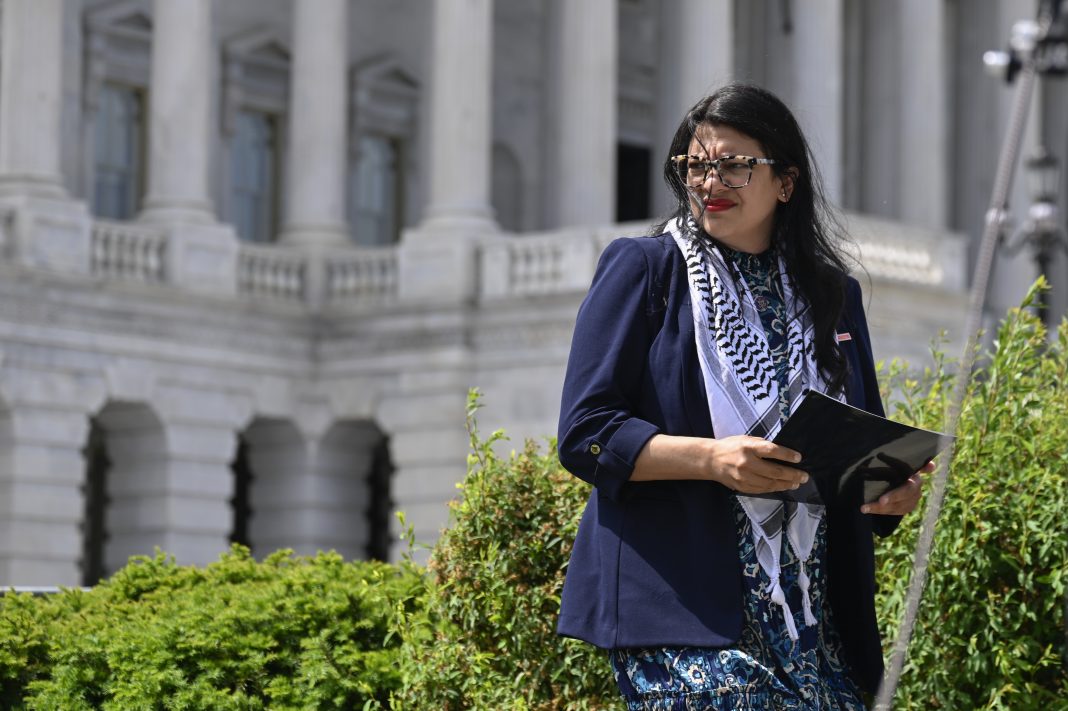In a striking episode that underscores the complexities of media representation and political discourse, recent events surrounding Rep. Rashida Tlaib, D-Mich., have ignited a firestorm of controversy. This situation not only highlights the challenges faced by public figures in navigating the treacherous waters of political commentary but also raises critical questions about journalistic integrity and the potential consequences of misinformation.
Over the past few days, prominent CNN anchors Jake Tapper and Dana Bash have come under fire for their handling of Tlaib’s remarks regarding Michigan Attorney General Dana Nessel. During segments on their respective shows, both anchors accused Tlaib of antisemitism, claiming she suggested that Nessel’s Jewish identity compromised her ability to perform her duties fairly. However, this assertion is fundamentally flawed, as Tlaib’s actual comments did not reference Nessel’s religion at all.
The controversy began when Tlaib criticized Nessel’s decision to prosecute 11 protesters from the University of Michigan who were demonstrating against the funding of Israel’s military actions in Gaza. Tlaib expressed concern about what she perceived as a bias in how the attorney general’s office handled cases related to Palestinian solidarity. “We’ve had the right to dissent, the right to protest,” Tlaib stated, emphasizing the importance of fair treatment across various social justice movements. Her comments were rooted in a broader critique of institutional biases against Palestinian voices, a sentiment echoed by many advocates for Palestinian rights.
Yet, in a rapid escalation of the narrative, Nessel responded by framing Tlaib’s critique as an antisemitic attack, asserting that it was wrong to imply her religious identity influenced her professional judgment. This reaction set off a chain reaction within the media, with Tapper and Bash amplifying Nessel’s interpretation without adequately verifying the facts. Tapper, during an interview with Michigan Governor Gretchen Whitmer, posed a leading question that suggested Tlaib had indeed made antisemitic remarks, to which Whitmer, perhaps seeking to avoid controversy, refrained from directly addressing the inaccuracies.
Bash further perpetuated this narrative, stating unequivocally that Tlaib had accused the Jewish attorney general of allowing her religion to influence her prosecutorial decisions. This misrepresentation not only mischaracterized Tlaib’s statements but also contributed to a broader media narrative that conflates legitimate criticism of government actions with antisemitism—a dangerous precedent that stifles open discourse on critical issues.
The fallout from this miscommunication has been significant. A group of 21 House Democrats issued a statement condemning Tlaib’s alleged comments, reinforcing the false narrative without acknowledging the actual context of her statements. This response reflects a troubling trend within political circles, where the fear of being labeled antisemitic can lead to the silencing of dissenting voices, particularly those advocating for Palestinian rights.
Steve Neavling, the journalist who initially reported on Tlaib’s comments, has actively sought to correct the record, emphasizing that Tlaib never made the statements attributed to her. His efforts to clarify the situation underscore the importance of accountability in journalism. As he pointed out, “This is a lie,” highlighting the responsibility of media figures to accurately represent the words and intentions of public officials.
The implications of this incident extend beyond Tlaib herself. It raises critical questions about the role of media in shaping public perception and the potential for misinformation to influence political discourse. In an era where social media amplifies narratives at lightning speed, the challenge of correcting falsehoods becomes increasingly daunting. As Neavling noted, “Correcting a widely spread lie is like putting toothpaste back in the tube.” Once misinformation takes root, it can be exceedingly difficult to dislodge.
Moreover, this incident serves as a reminder of the broader societal dynamics at play. The weaponization of accusations of antisemitism against those who advocate for Palestinian rights not only silences dissent but also complicates the discourse surrounding a deeply contentious issue. It raises the stakes for public figures who dare to speak out, often forcing them to navigate a minefield of potential backlash and misrepresentation.
As this narrative continues to unfold, it is crucial for both media and political figures to engage in a more nuanced and responsible dialogue. The stakes are high, and the consequences of misrepresentation can be profound, not only for individuals like Tlaib but for the broader discourse on justice, equity, and human rights. In an increasingly polarized environment, fostering an atmosphere of open dialogue and understanding is essential for the health of our democratic institutions.

